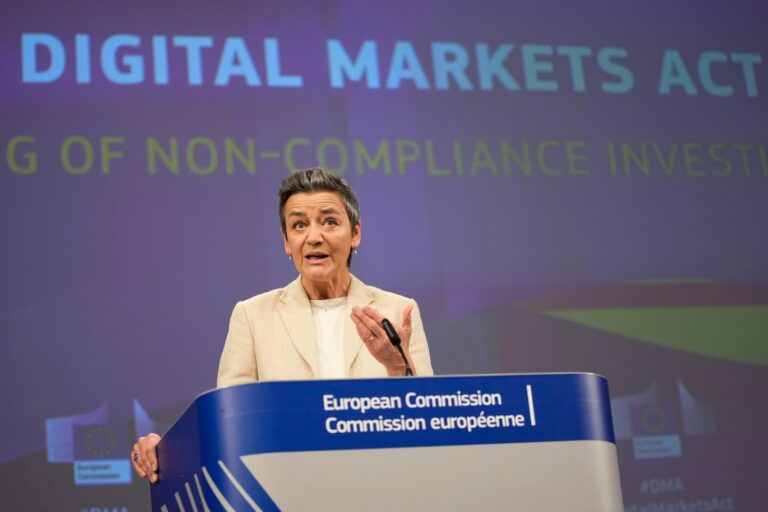“Incentives are key to making app developers less reliant on gatekeeper app stores and helping consumers become aware of better offers,” Margrethe Vestager, the EU executive vice-president for competition policy, wrote.
The EU is due to make a final decision on the case by March and could impose fines of up to 10% of Apple’s global revenue. Apple, which has revenue of $383.3 billion in fiscal 2023, said it continues to listen and respond to the European Commission’s input.
Get caught up in
Stories to keep you up to date
The allegations are the latest in a series of regulatory challenges facing Apple as governments around the world scrutinize the company’s exercise of enormous market power.
In March, the Department of Justice and attorneys general of 15 states and the District of Columbia sued Apple for violating federal antitrust laws. The lawsuit is similar to the issues raised by EU regulators, and antitrust experts say the findings against Apple could bolster the case brought by U.S. prosecutors.
And in March, the EU fined Apple about $2 billion after rival Spotify filed an antitrust complaint, saying the company stifled competition through its app store and “abused” its dominance over music streaming services.
Apple is in a fierce battle with AI chipmaker Nvidia and Microsoft for the top spot among the world’s most valuable companies, with all three having traded back and forth for the top spot in recent weeks. On Monday, Apple’s market capitalization hovered near $3.2 trillion.
Experts say the European Commission’s charges indicate regulators are serious about pressing Apple to open up its app store to substantial competition. Gene Kimmelman, who served as deputy assistant attorney general at the Justice Department early in the Biden administration, said Apple’s current pricing structure would not be enough to satisfy regulators.
“European regulators have made it clear that Apple must overhaul and potentially eliminate most of the fees it charges developers and those trying to set up competitive app stores,” Kimmelman said.
The EU challenged some of the policies Apple imposes on app developers, such as banning them from providing pricing information or promoting certain offers within their apps, as well as the rules governing linking customers to other apps and certain fees that Apple charges.
The accusations come four months after the EU launched an investigation focused on steering rules by Apple and Alphabet.
Apple said in a statement that it had made several changes in recent months after receiving feedback from developers and European regulators. The company said its new features, including the ability to direct users to the web at competitive rates, are available to all developers doing business in the EU app store.
“We are confident that our plans comply with the law and estimate that under the new terms we have created, more than 99 percent of developers will pay the same or lower fees to Apple,” the company said in a statement.
Rebecca Ho Allensworth, a professor at Vanderbilt University Law School, said Monday’s announcement reflects an ongoing process in which EU regulators are working out the details of how to interpret and apply digital markets law.
“This is a time when we’re trying to figure out exactly what that means,” she said. “I’m sure there will be some back and forth of interpretation.”
The EU also announced that it had opened a new investigation into the terms of Apple’s contracts with developers, specifically the €0.50 (roughly 54 cents) fee that developers must pay for each installed app, and Apple’s membership program for developers, as well as the “multi-step user journey” required to download and install alternative app stores on iPhones.
Shira Ovide contributed to this report.

